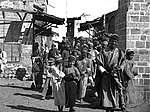Meged oil field
Oil field disputesOil fields in IsraelPages containing links to subscription-only content

The Meged oil field is an oil field that was first discovered in the 1980s but declared to not be commercially viable at the time. In 2004, Givot Olam Oil declared to have made it commercially viable to drill. It is one of the largest on-shore oil fields in Israel. It began production in 2010 and produces oil as well as some natural gas. Its proven oil reserves are about 1,525 million barrels (242.5×10^6 m3).
Excerpt from the Wikipedia article Meged oil field (License: CC BY-SA 3.0, Authors, Images).Meged oil field
חוצה בנימין, Hevel Modiin Regional Council
Geographical coordinates (GPS) Address Nearby Places Show on map
Geographical coordinates (GPS)
| Latitude | Longitude |
|---|---|
| N 32.040894444444 ° | E 35.000211111111 ° |
Address
megdal 5
חוצה בנימין
4082027 Hevel Modiin Regional Council
Center District, Israel
Open on Google Maps









